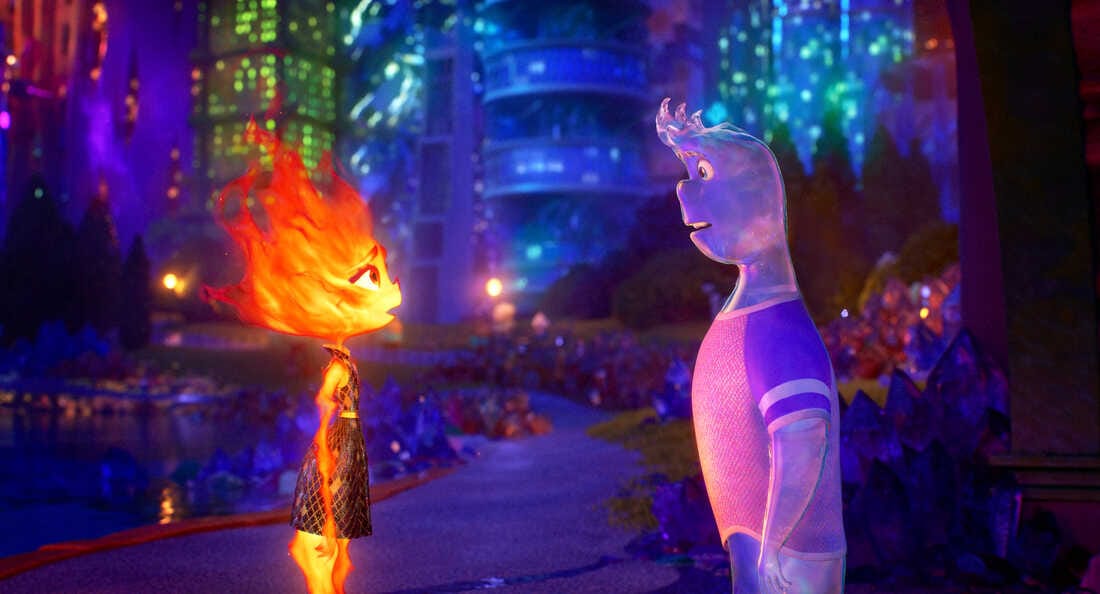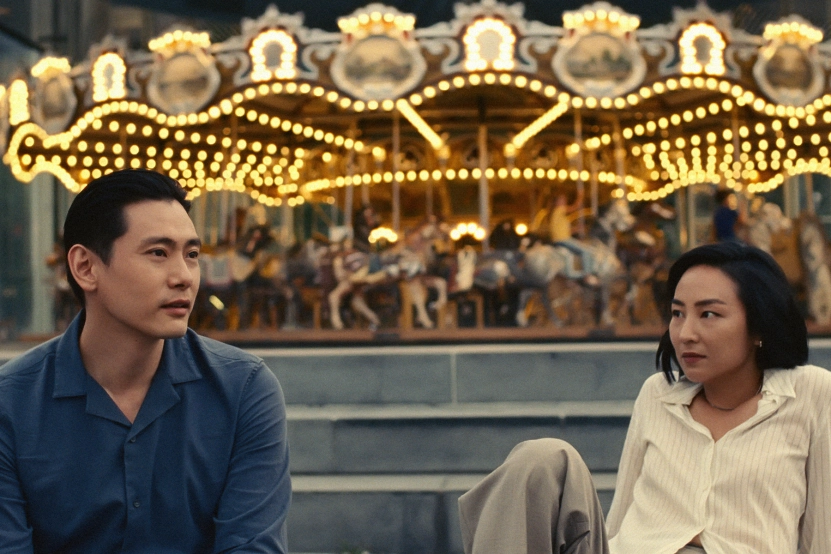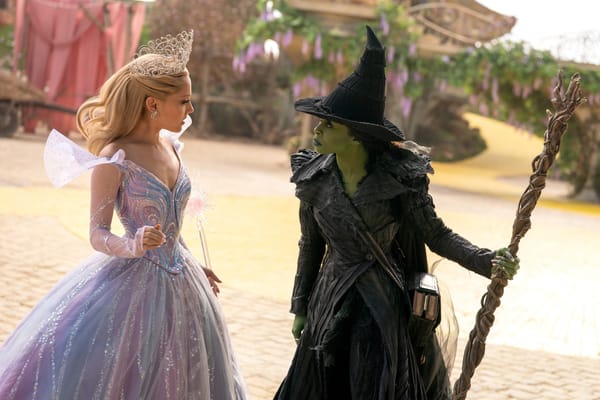'Elemental' and 'Past Lives' Present Two Distinct Visions of the Immigrant Experience
A few thoughts on Pixar and A24's latest and what they may or may not have in common.

I don’t watch movie trailers very often these days so I was a bit surprised to discover that two recent wide release movies tackle the same topic: the American immigrant experience. Both Elemental (in theaters everywhere) and Past Lives (out now in limited release, expanding wider this weekend) are about immigrants but they approach the subject in radically different ways. As an immigrant myself (my parents came to America when I was two years old), I thought it was worth reflecting on how these films resonated with me. This post will contain basic plot details for both films.
Elemental takes place in Element City, a land where anthropomorphized elements make their home. Earth, wind, and water have coexisted peacefully since time immemorial. As the film begins, a fire family (i.e. a mother, father, and a daughter made out of fire) arrives in Element City seeking a better life, but they don’t feel particularly welcome as the city is not designed for elements like them. For one thing, there’s water and water people everywhere and it can often “put them out,” requiring them to consume wood to reconstitute themselves. But also, the other elements generally aren’t huge fans of how the fire people look and behave, and how their fire-ness impacts their way of life. So the fire family sets up a small shop in an abandoned neighborhood, selling fire-related foods and goods. Over time, other fire people join them and the fire people build a vibrant, if segregated, community.
The main character of the film is Ember (Leah Lewis), a fire daughter who is trapped between two worlds. On the one hand, she wants to honor her parents by taking over their shop so they can finally rest. On the other, she wants to explore the world and see what other opportunities lie beyond her neighborhood. Things become particularly fraught when she develops feelings for Wade, a water person — generally regarded as incompatible with fire people. Will Ember figure out a way to honor her parents? Will she betray her old way of life in search of self-actualization? Or will she find a way to make everyone’s dreams come true, including her own? It’s a Pixar film so you can probably guess where this is going.
I found the aspects of the film that focused on Ember’s family to be enormously powerful. I was less impressed by the rest of the film, which involves a half-baked love story and a bizarre subplot about Element City building codes and safety (yeah, it’s weird). All that said, I still think the film is worth watching in theaters, as Pixar is one of the few companies even attempting original storytelling at this scale right now.
From my perspective, the fire people in Elemental are coded as Asian characters, with aspects of East Asia and South Asia in the mix, but it’s possible to interpret them as any type of immigrant. Like the fire people, many Asian Americans banded together in the face of discrimination and created communities where they could safely coexist. And like Ember, many Asian American children find themselves challenged by the demands of assimilation. Asian parents often want their children to honor their old ways, morals, and codes that include things like filial piety and collectivism. But Asian children exist in a culture with a vastly different set of values that prizes individualism and independence.
Ultimately, Elemental presents a rather conventional portrait of the immigrant experience. When the fire people came to Element City, they faced enormous challenges, leaving everything they knew and loved behind for the chance of a more economically secure (or in the case of Elemental, ecologically secure) future. Their children face a different challenge that’s no less daunting: How to adapt to the new world when your heart tells you to do one thing but your circumstances tell you to do another. So it is.

Past Lives takes a different, less conventional approach to the immigrant story. In Past Lives, we meet Nora (first played by Moon Seung-ah, then later by a luminous Greta Lee) a 12-year old girl living an ordinary life in South Korea. She befriends a young man named Hae Sung (Leem Seung-min, then Teo Woo) who takes a budding romantic interest in her. But Nora’s family decides to leave South Korea for North America and Nora, as an aspiring young artist, is quite taken with the idea. In her mind, you can’t win the Nobel Prize in literature if you’re from South Korea. Taking place over the course of several decades, Past Lives gives us several snapshots of Nora and Hae Sung’s relationship as their lives move in different trajectories and intersect in unexpected ways.
In many immigrant stories, the vision of America that’s shown is one of possibility and hope. People flee oppression or economic hardship for the promise of something better, albeit unknown. What makes Past Lives so unique is that it shows which stories are interrupted after someone leaves. From Nora’s perspective, her life is one of forward progress, as she moves from South Korea to Canada and eventually ending up in New York City as a playwright. For Hae Sung, he experienced a promising friendship and relationship that abruptly ended, leaving a boatload of “What ifs” in his mind.
My mother occasionally told me stories about how comfortable life was back in Taiwan. She was making good money as an instructor at a prestigious music school. But she gave it all up in the hopes of providing a better life and education for my brother and me. I think all of us ended up in a better situation than we would’ve otherwise been in, but I will never forget the longing in her voice and she talked about her past life. Immigrating is a massively disruptive experience to one’s circumstances and psyche. Many Asian families who immigrate need to re-learn everything they know about how to operate in society in order to be successful. And for many people like my mother — and like the characters in Past Lives — immigrants live with a curiosity of what could’ve been if they’d stayed behind. How many friendships never happened because you left? How many relationships? What marriages and children might have resulted if you’d opted for the more comfortable path? These are haunting questions and they are ever-present in Past Lives as Nora moves through her life in New York.
People and the decisions they make are inextricably tied with their environs. Writer/director Celine Song brings this idea to life by using wide angles to frame her characters in the midst of detailed backdrops. She also takes a light approach when it comes to editing and dialogue. Scenes often play out in a two shot, with very little cutting or conventional shot-reverse-shot. The audience experiences the pregnant pauses, the awkwardness, the weight of these interactions, and all that is spoken and unspoken between these characters.
Past Lives is one of the best films of the year so far. Beautifully shot, wonderfully acted, and deeply evocative, it gets my highest recommendation.
[Also: Stay tuned for my interview with writer/director Celine Song, which I’ll be publishing here and across my video channels.]
Thanks for reading Decoding Everything! Subscribe for free to receive new posts and support my work.
Other Stuff David Chen Has Made
- On The Filmcast, we reviewed The Flash, a movie we all enjoyed and the rest of America did not.
- On Decoding TV, Roxana Hadadi and I are covering the new season of Black Mirror. We’ll have detailed discussions of every episode, so be sure to subscribe and catch’em all.
- On my YouTube channel, I tried to speculate on why The Flash bombed at the box office this past weekend.
- Also on YouTube, my wife and I tried to rank all existing Mission: Impossible films.
- [PAID ONLY] On my personal Patreon, I host a podcast called Dave on Dave, where David Cho gives me feedback on my online work. In a recent episode, we discussed some setbacks I’ve experienced recently.
- [PAID ONLY] Also on the Patreon: my initial reactions to Elemental, in audio form.



